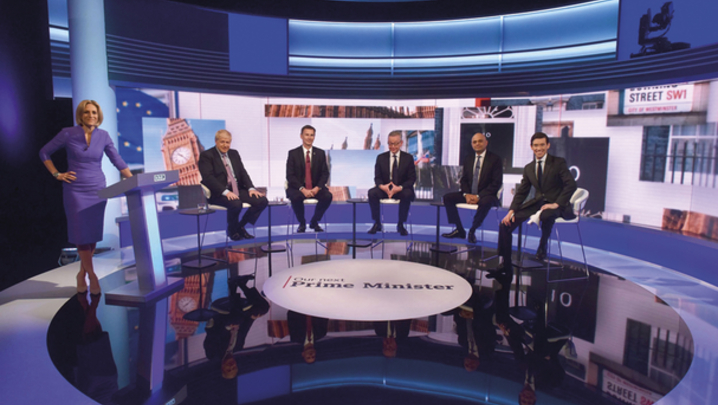How well prepared is the UK TV sector for Britain’s departure from the EU? Kate Bulkley investigates
Getting clarity on what Brexit will mean for the UK audio-visual (AV) sector is, at this stage, a near impossibility. What is clear is that the past three years of Brexit politicking have been accompanied by a huge amount of contingency planning for a no-deal Brexit.
Add to that the continued strength of TV and film production in the UK, thanks largely to a skilled talent pool, UK tax breaks and significant investment from the likes of Disney, Netflix and Sky, and the consensus is that the sector is well placed to withstand any fallout from Britain leaving the EU.
There are issues that need to be ironed out, of course, particularly around talent and access to European markets for programme sales. With no-deal still on the cards, some advertisers still appear cautious about their spending, although that is being eclipsed by new worries over the economic impact of the Covid-19 virus.
Reassuringly, the long visibility of a potential no-deal Brexit means that there are few unknown issues and, according to many executives in the creative industries, none with the potential to derail one of the most prominent drivers of the UK’s economic performance.
Indeed, some in the sector are looking ahead to the potential benefits that an update to the UK’s Communications Act 2003 could provide. A new act would not have to comply with the EU’s Audiovisual Media Services Directive (AVMSD).
“There are arguments to say that, if we could tailor a better regime for the UK’s media ecosystem, we could do even better,” suggests a major broadcaster’s senior policy expert.
A number of media companies, including Viacom, Discovery, the BBC and NBCUniversal, have already taken steps to deal with one of the bigger Brexit-related issues. They have either relocated their European broadcasting licences – and in some cases their HQs – from London to mainland Europe, or they have devised other ways to get around the likelihood that, in time, their Ofcom licences to broadcast channels from the UK to continental Europe will become ineffective.
The number of channels based in the UK dropped by 5% in 2019 due to Brexit, according to the European Audiovisual Observatory.
EU rules on content portability is something else the TV business is taking in its stride. In a no-deal scenario, UK citizens will lose the ability to access their subscription content while travelling in mainland Europe.
If the UK falls out of the EU’s content portability agreement, EU citizens travelling to the UK will be unable to watch their TV services in Britain. “Losing portability is not something we see as a big challenge to our business,” said a senior broadcaster.
There are, however, concerns over the potential impact of UK content no longer qualifying under European programming quotas as “European works”. Under existing rules, UK content competes on an equal footing with European content. But, post-Brexit, there is a fear that UK content will be treated as “foreign acquired” content. That could make it more difficult to sell UK-produced shows in the EU.
“Our continental competitors are already making noises, asking why the UK should get benefits such as qualifying for these quotas when it is no longer part of Europe,” says John McVay, CEO of Pact, the independent producers organisation.
"Today, EU countries account for about a third of British programming exports"
“It’s not an immediate issue,” he maintains, “but, given some of the comments by the French CNC [National Centre for Cinema and the Moving Image] and some others recently, they clearly think that punishing the UK is good for their own local production industries.”
Alice Enders of Enders Analysis thinks this loss of access is potentially the biggest issue for TV businesses based here if the UK fails to reach a trade deal with Brussels. “Our potential removal of the European works quotas in our law would nullify a condition of the Convention on Transfrontier TV legislation of 1989, and thus impair for ever exports relating to quotas on
the Continent.”
Today, EU countries account for about a third of British programming exports, according to Pact. But, even if the rules do change regarding quota qualification, it may still not reduce the volume of UK content sales to Europe.
Ultimately, buying decisions depend on the quality of the programmes. Broadcasters and platforms need quality content that can please audiences and advertisers. “European broadcasters will have to look to see if there are alternative sources capable of delivering the same levels of viewing,” says McVay.
Another issue concentrating minds in the event of no-deal is: will talent and production crews be able to move freely across the borders of EU states? At the very least, navigating any new visa rules will add administrative time and costs and mean more work for HR departments.
In an industry where budgets are tight, this could have a disproportionate impact on smaller indies and shows that require certain skills, for example, in special effects and animation. But McVay believes the sector will cope: “We need a system that is manageable, cost-effective and easy to understand. But production teams are used to coping with complex logistics and administration.”
That said, the British Government’s proposed points-based visa system is based on skill levels, educational qualifications and pay levels. These criteria are not best suited to the TV sector where, under present proposals, many of the required skills will not qualify. If the rules are not modified, it will take time to upskill the UK workforce.
Then there is the problem of the UK’s ability to attract talent. “A lot of value creation in the AV space involves people who are disruptive and innovative,” says Ingrid Silver, a media partner at law firm Reed Smith. “If you want to replicate the Silicon Valley environment, where talent flourishes, you can’t do that with the proposed points system. Some kid with a great idea won’t qualify, so you would be losing a big opportunity.”
Another potential loss to producers concerns their access to European media funding schemes such as Creative Europe. It offers distribution benefits to producers of independent feature films and routes to development finance. UK animation and documentary makers have tapped these funds.
But Pact argues that they are a modest part of the low double digits of millions available across the TV and film sector. “Government will have to take a view on all the programmes that are part of the European club and on whether they will support these funds,” says McVay. “The corollary is: if we aren’t going to stay in these schemes, can the money that the UK has put into these European mechanisms come back to our AV sector, rather than going into roads or another part of the economy?”
An issue with particular consequences for online players is whether the UK, post-Brexit, maintains the EU’s copyright directive. This requires platforms to license content for private users, as opposed to the old rules where platforms were required to take action to remove content only after an infringement notice was filed by a copyright holder.
There is little visibility on this so far but, given Ofcom’s new role regulating online content to prevent harm, it is reasonable to assume that there will also be proactive policing for copyright breaches.
Ultimately, though, the UK is firmly established as the world’s second most important English-language content producer and exporter after the US. According to one senior broadcaster, the UK has more pressing domestic challenges, such as Ofcom’s PSB review, that are likely to have a bigger impact than Brexit.





